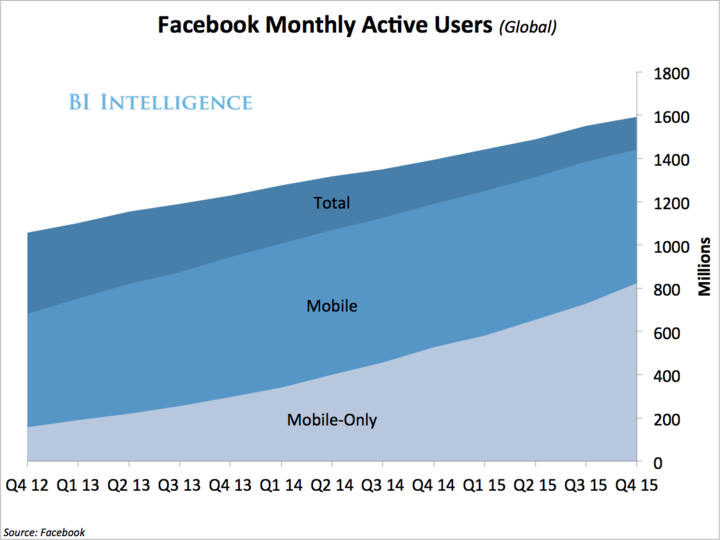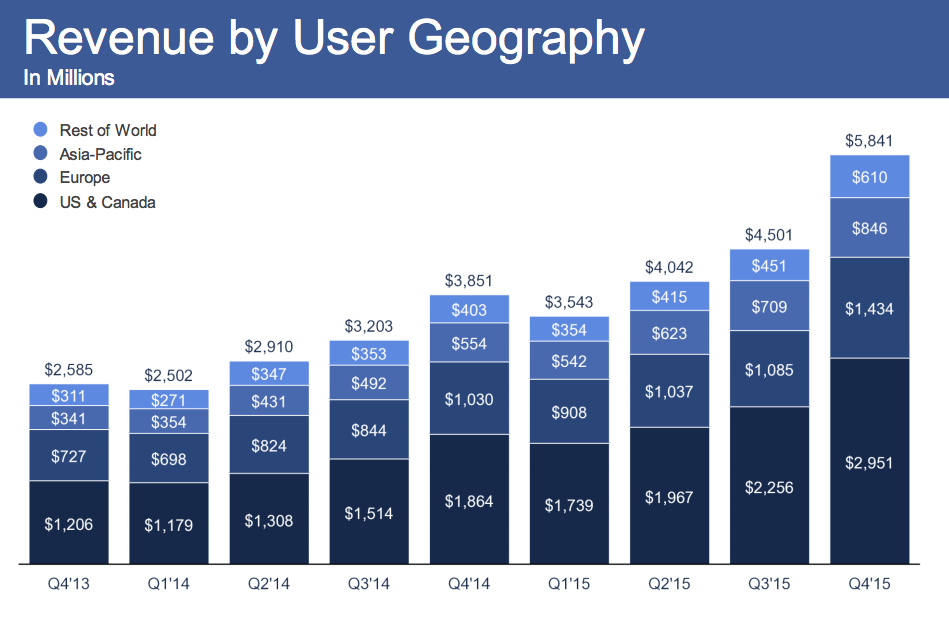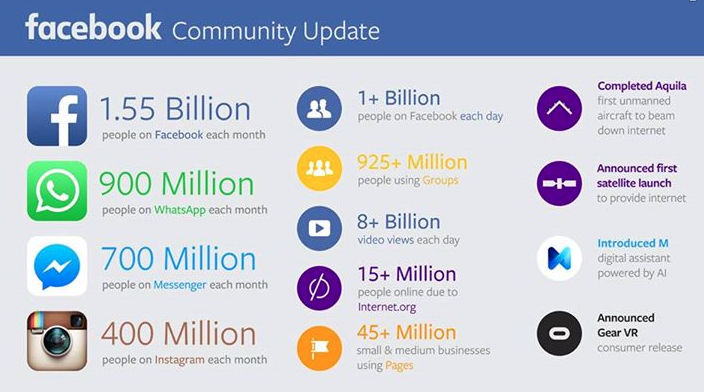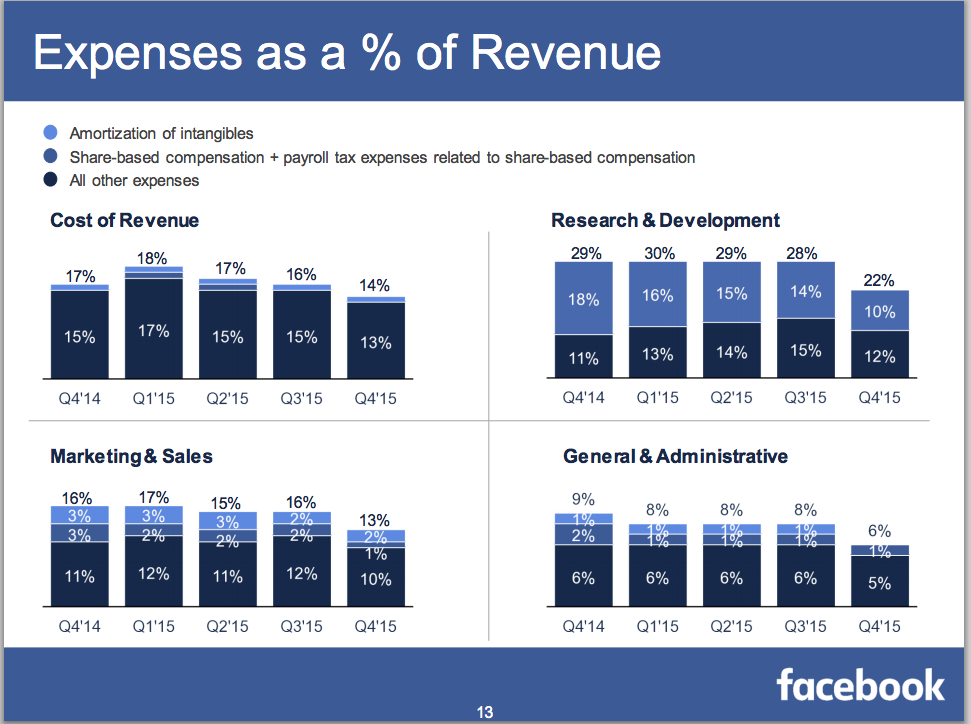Inspired by record earnings, Facebook plans to more actively take away the “bread” from Twitter and compete with YouTube
Internet giant Facebook , which owns no less a giant social network of the same name, showed record earnings for the past (fourth) quarter. The company's financial results exceeded all analysts' expectations.
Net quarterly profit exceeded $ 1 billion. It increased to $ 1.56 billion ($ 0.54 per share) compared with $ 701 million ($ 0.25 per share) for the same period of the previous year. The company's profit, excluding one-off factors, was $ 0.79 per share, exceeding the average Wall Street analyst forecast of $ 0.68 per share.
The company's revenue grew by 52% - to a record $ 5.84 billion against. A year earlier, it did not exceed $ 3.85 billion in the same quarter. The average expert forecast for this indicator was $ 5.37 billion.
')
The number of active users of the world's largest social network (account activity at least once a month) at the end of the IV quarter was 1.59 billion, which is 2.6% more than a quarter earlier.

According to data submitted by Facebook, over the past December, its average daily audience was about 1.04 billion users. This is 17% more than in December 2014.
“The community of our network continues to grow, and our business is booming. 2015 was a great year for Facebook, ”said Facebook founder Mark Zuckerberg.

Shares of the company on the news reporting have increased by 12% (to $ 105.32 per share). Last year, Facebook's capitalization grew by 34% and exceeded $ 300 billion at the peak. However, since the beginning of 2016, it fell by 9.7% against the background of a general collapse of the stock market.
The good results of the company are associated with a sharp increase in Facebook mobile advertising - it was she who brought 80% of the company's total advertising revenue.
At the end of the third quarter, Facebook videos scored eight billion views a day, their audience numbered five hundred million. This result is quite possible, since the video in the users' feed is automatically turned on, and Facebook considers viewing the video for three seconds to watch the video.
The video needs Facebook because advertisers pay more for video ads than for banners.
Today it became known that Facebook users are viewing 100 million hours of video every day. This is a new metric, introduced in the image and likeness of a similar YouTube metric.
However, back in December 2014 at YouTube, this figure exceeded 300 million hours. Moreover, representatives of the video service claim that every year this figure increases by 60%.
Facebook has launched a platform for discussing sports events in real time with friends.
“We created a place dedicated to sports, so you can feel that you are watching the game with friends, even if you are not together,” explained product manager Steve Kafka.
Facebook Sports Stadium allows you to see the comments of friends, experts, journalists about sports events in real time. The service will allow you to keep track of the score and other statistics, as well as find out information where and how the competition of interest can be watched on TV.
"Facebook is the largest stadium in the world, which has 650 million sports fans," the release says.
Similar functionality is available on Twitter. Moreover, the public exchange of short messages is the idea that Twitter was created by. Therefore, Facebook with its new platform may well entice part of its audience.
In October, Facebook announced the start of a public testing of “Reactions” (Reactions) - a new set of buttons that allow expressing different attitudes to materials in its news feed.
“Reactions” are designed to expand the social capabilities of the “Like” button that has existed since 2010. It is assumed that in this way users of the network will be able to evaluate such materials for which the “I like” attitude looks out of place: as a rule, we are talking about all sorts of disasters, crimes and other events of a clearly negative nature.
Facebook today announced that a new feature is about to be launched.
To the usual button "Like" six more are added, expressing such emotions as love, laughter, happiness, shock, sadness and anger.

The idea of expanding the reactions came from the developers of the corporate Slack messenger and was successfully implemented long before it was announced by Facebook.
The Facebook Messenger app, which separated from Facebook in April 2014, is now used by 800 million people. In September 2015, Messenger took the second place in the ranking of applications for smartphones, overtaking Youtube. Through Messenger every day users send nine and a half million photos.
Messenger and WhatsApp will not make Facebook profits yet. The company's CFO David Uener said that at the moment the company is interested in the growth of the audience of applications, and the financial side is not yet the main one.

Facebook Messenger is testing the M digital assistant service . M is a digital assistant integrated into the Facebook Messenger application. Unlike Apple Siri, Google Now or Microsoft Cortana, M can perform complex tasks directly. He will not only be able to provide information, and, for example, set deadlines for meetings, but also be able to buy something and arrange for the delivery of a gift. Also with the help of an assistant it will be possible to book a table in a restaurant or tickets for a trip. In addition, M itself can order Uber ridesharing services.

Facebook spending in the past quarter was not as unprecedented as revenue. However, they grew by 21%.
The company continues to actively invest in various projects, but experts expect a further slowdown in its spending growth in 2016. For example, Bernstein Research predicts that Facebook's revenue this year will increase by 39%, and costs - by 32%.
Social media reporting exceeded expectations - analysts predicted quarterly profit growth of 30–40%.
Rob Sanderson, an analyst with MKM Partners, believes that Facebook was able to show such impressive quarterly earnings against the background of the fact that the high dollar exchange rate negatively affects the financial results of American companies by reducing sales abroad.
Net quarterly profit exceeded $ 1 billion. It increased to $ 1.56 billion ($ 0.54 per share) compared with $ 701 million ($ 0.25 per share) for the same period of the previous year. The company's profit, excluding one-off factors, was $ 0.79 per share, exceeding the average Wall Street analyst forecast of $ 0.68 per share.
The company's revenue grew by 52% - to a record $ 5.84 billion against. A year earlier, it did not exceed $ 3.85 billion in the same quarter. The average expert forecast for this indicator was $ 5.37 billion.
')
The number of active users of the world's largest social network (account activity at least once a month) at the end of the IV quarter was 1.59 billion, which is 2.6% more than a quarter earlier.

According to data submitted by Facebook, over the past December, its average daily audience was about 1.04 billion users. This is 17% more than in December 2014.
“The community of our network continues to grow, and our business is booming. 2015 was a great year for Facebook, ”said Facebook founder Mark Zuckerberg.

Shares of the company on the news reporting have increased by 12% (to $ 105.32 per share). Last year, Facebook's capitalization grew by 34% and exceeded $ 300 billion at the peak. However, since the beginning of 2016, it fell by 9.7% against the background of a general collapse of the stock market.
The good results of the company are associated with a sharp increase in Facebook mobile advertising - it was she who brought 80% of the company's total advertising revenue.
Facebook video. Inconvenient metric
At the end of the third quarter, Facebook videos scored eight billion views a day, their audience numbered five hundred million. This result is quite possible, since the video in the users' feed is automatically turned on, and Facebook considers viewing the video for three seconds to watch the video.
The video needs Facebook because advertisers pay more for video ads than for banners.
Today it became known that Facebook users are viewing 100 million hours of video every day. This is a new metric, introduced in the image and likeness of a similar YouTube metric.
However, back in December 2014 at YouTube, this figure exceeded 300 million hours. Moreover, representatives of the video service claim that every year this figure increases by 60%.
Facebook takes bread crumbs from Twitter
Facebook has launched a platform for discussing sports events in real time with friends.
“We created a place dedicated to sports, so you can feel that you are watching the game with friends, even if you are not together,” explained product manager Steve Kafka.
Facebook Sports Stadium allows you to see the comments of friends, experts, journalists about sports events in real time. The service will allow you to keep track of the score and other statistics, as well as find out information where and how the competition of interest can be watched on TV.
"Facebook is the largest stadium in the world, which has 650 million sports fans," the release says.
Similar functionality is available on Twitter. Moreover, the public exchange of short messages is the idea that Twitter was created by. Therefore, Facebook with its new platform may well entice part of its audience.
Zero emotion
In October, Facebook announced the start of a public testing of “Reactions” (Reactions) - a new set of buttons that allow expressing different attitudes to materials in its news feed.
“Reactions” are designed to expand the social capabilities of the “Like” button that has existed since 2010. It is assumed that in this way users of the network will be able to evaluate such materials for which the “I like” attitude looks out of place: as a rule, we are talking about all sorts of disasters, crimes and other events of a clearly negative nature.
Facebook today announced that a new feature is about to be launched.
To the usual button "Like" six more are added, expressing such emotions as love, laughter, happiness, shock, sadness and anger.

The idea of expanding the reactions came from the developers of the corporate Slack messenger and was successfully implemented long before it was announced by Facebook.
Not a single Facebook
The Facebook Messenger app, which separated from Facebook in April 2014, is now used by 800 million people. In September 2015, Messenger took the second place in the ranking of applications for smartphones, overtaking Youtube. Through Messenger every day users send nine and a half million photos.
Messenger and WhatsApp will not make Facebook profits yet. The company's CFO David Uener said that at the moment the company is interested in the growth of the audience of applications, and the financial side is not yet the main one.

Facebook Messenger is testing the M digital assistant service . M is a digital assistant integrated into the Facebook Messenger application. Unlike Apple Siri, Google Now or Microsoft Cortana, M can perform complex tasks directly. He will not only be able to provide information, and, for example, set deadlines for meetings, but also be able to buy something and arrange for the delivery of a gift. Also with the help of an assistant it will be possible to book a table in a restaurant or tickets for a trip. In addition, M itself can order Uber ridesharing services.
"A drop of tar"

Facebook spending in the past quarter was not as unprecedented as revenue. However, they grew by 21%.
The company continues to actively invest in various projects, but experts expect a further slowdown in its spending growth in 2016. For example, Bernstein Research predicts that Facebook's revenue this year will increase by 39%, and costs - by 32%.
Social media reporting exceeded expectations - analysts predicted quarterly profit growth of 30–40%.
Rob Sanderson, an analyst with MKM Partners, believes that Facebook was able to show such impressive quarterly earnings against the background of the fact that the high dollar exchange rate negatively affects the financial results of American companies by reducing sales abroad.
Source: https://habr.com/ru/post/298234/
All Articles